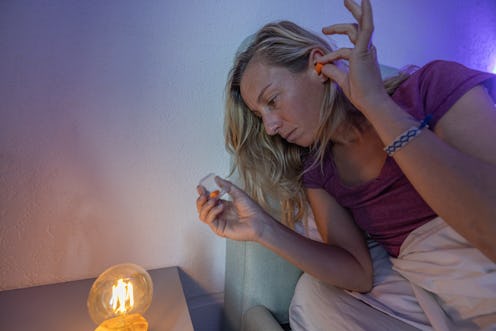Life
Why You Might Want To Stop Using A Sleep Tracker

Looking for those perfect seven to nine hours of undisturbed rest each night? According to a new study, this quest for perfection may come at a cost — if you make regular use of a sleep tracker: Research out of Rush University Medical Center suggests that tracking sleep may actually lead to sleep problems. Might be time to put away that technology at bedtime for good, right?
According to the case studies, recently published in Journal of Clinical Sleep Medicine, 15 percent of adults living in the United States own a wearable motion-tracking device. These popular gadgets quantify movement, allowing the wearer to track how many steps they take each day and how much sleep they get each night. It's no surprise that people have taken an interest in improving their zzzs — sleep quality, along with diet and exercise, has momentous effects on health and wellbeing. However, carefully monitoring your sleep cycle and fixating on the data can apparently lead to feelings of anxiety and obsessiveness that leave you lying awake at night.
Researchers dubbed this preoccupation with the "quantified Self" and obtaining the perfect night's sleep "orthosomnia," which means "correct sleep." The term suggests that despite good intentions, this quest for perfection can be damaging. "We chose this term because the perfectionist quest to achieve perfect sleep is similar to the unhealthy preoccupation with healthy eating, termed orthorexia," the study's authors note.
One of the case studies published in the paper describes the nighttime struggles of a man called "Mr. R". He noticed that when he got a poor night's sleep, he would (unsurprisingly) wake up irritable and absentminded. With the use of a new sleep tracker, he determined that he only felt this way if he didn't — according to the device — get eight hours of sleep a night. He set the lofty goal to sleep a full eight hours every night, but instead of improving his mood, the anxiety produced by the pressure to get a full eight hours made his sleep quality and quantity both decline. While around eight hours is recommended by most sleep researchers, reaching for perfection has other pitfalls. “People can get into bed too early, before they’re really sleepy," notes co-author of the study Kelly Glazer Baron. "Or lay in bed longer trying to force themselves back to sleep.”
Those who rely on the exacting data acquisition capabilities of these devices to determine the state of their physical and mental health may be disappointed. The data isn't always reliable — such as in the case of "Ms. B" whose sleep data conflicted with that of a polysomnography test during a sleep study she underwent: Her wearable declared she had been sleeping poorly, while the lab test measuring her heart rate and brain waves reported that she had gotten plenty of deep sleep. The study reports that these devices are not always accurate when it comes to sleep stages. "They are not able to differentiate between light and deep sleep," Baron explains in a press release. "They might call it sleep when you're reading in bed."
Before you toss that wearable in the bin, though, sleep trackers can certainly give you a general idea of how much sleep you are getting a night, which can be pretty interesting. The key is to not put too much stock in what the devices are saying about your patterns. If you think you have an issue, see a specialist instead.
Everybody is different when it comes to the perfect amount of sleep they need to feel alert and rested, and staring at a phone before bed likely won't help. Worry too much about getting a good night sleep, and you may ruin your chances — as Alanis Morrissette says, “Isn’t it ironic?”
Images: swissmediavision/E+/Getty Images; Giphy
This article was originally published on